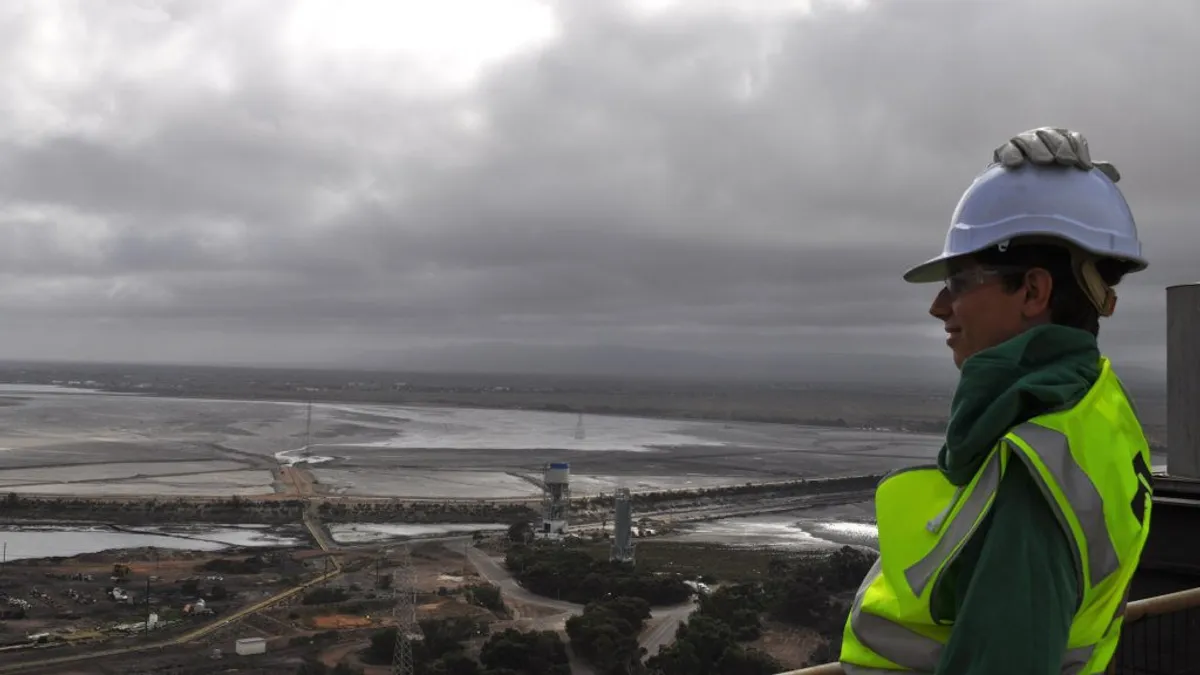Dive Brief:
-
Virginia Gov. Ralph Northam, D, on Wednesday signed into law a bipartisan bill that would require Dominion Energy to excavate all the coal ash at their coal plants in the state, over 27 million cubic yards.
-
The bill, first introduced in January, will also require that at least a quarter of the waste be recycled. The remaining ash would have to be moved into fully lined basins to prevent further groundwater contamination.
- Dominion Energy had originally indicated its preference for a "cap in place" closure, the favored method of most utilities, but an analysis released by Dominion in November found that it would be more cost effective to recycle a portion of the ash and sell it to interested bidders than initially reported.
Dive Insight:
The governor’s approval of the bill as well as the bipartisan support it received in both state chambers marks a rare legislative intervention against utility plans to store coal ash at their plant sites as companies continue to clash with environmental groups over the most effective methods to handle the waste.
There was "very much a battle over whether this bill would get passed in any substantial form," Nate Benforado, staff attorney at the Southern Environmental Law Center who worked closely on the legislation, told Utility Dive.
"It's a huge development that really shows how far we've come over the past few years" and represents an "understanding of environmental risks of existing contamination and understanding there's a cost-effective solution," he said.
While most utilities argue that leaving the waste in place is effective and more economic, environmental groups have long said that method does not adequately protect groundwater.
After a report from Earthjustice in December found that 67 coal plants across 22 states were violating federal pollution standards at their coal ash sites, several environmental groups filed a petition for review against the Environmental Protection Agency, concerned that utilities weren't being forced to excavate those sites quickly enough.
Five plants on that list were owned by Dominion Energy in Virginia, and groundwater filings showed all of those plant sites would require cleanup after reporting unsafe levels of metal contaminants including cobalt, lithium and arsenic.
Four coal ash ponds near the Chesapeake Bay Watershed in the state have been subject to legislation over the past two years, which prevented Dominion from using the cap in place closure method until a more holistic assessment was made. The economics of recycling a portion of the waste and the environmental implications for excavating all Virginia pits entirely led to the "very unique" bipartisan agreement, said Benforado.
Recycling the waste has proven to be effective in other states across the Southeast, many of which have sites near waterways that are vulnerable to flooding, especially as storms continue to intensify from warming waters. Duke Energy recycled 79% of the ash it produced in 2018, and 68% in its North Carolina territory, where record-breaking rains from Hurricane Florence triggered a coal ash spill in September that released more than 2,000 cubic yards of the waste.
Recycling "is a very feasible cost-effective approach that’s working in other states like North Carolina and South Carolina and should be working in Virginia too. And I think the sort of culmination of having a commercially successful closure method that permanently solves the environmental problem ... I think that's what led to where we are now," said Benforado.
Dominion did not attend an event with state officials announcing the bill agreement in January. But the utility "supports the comprehensive agreement reached by the Governor, legislative leaders, and members of the General Assembly that accomplishes clean closure, minimizes truck traffic, and prudently manages customer costs for the closing of ash ponds at our power stations," it said in a statement emailed to Utility Dive.














